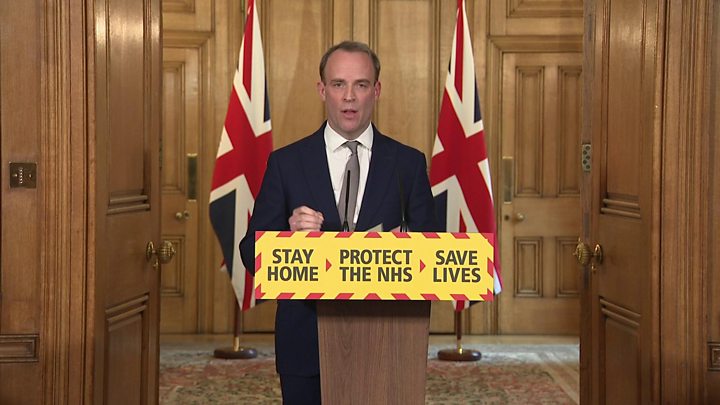
Prime Minister Shinzo Abe said the state of emergency will last until May 6, adding that the goal is for residents to limit contact with others by up to 80%. Franck Robichon/AP hide caption
Japan's Prime Minister Shinzo Abe declared a nationwide state of emergency, expanding the one put in place less than two weeks ago that covered Tokyo and six other prefectures as the deadly coronavirus continues to spread.
The prime minister also announced plans to give stimulus funds of 100,000 yen, the equivalent of about $930, to each of Japan's 120 million citizens to lessen the economic hardship of the faltering Japanese economy.
Japan's first modern state of emergency was put into place early last week. It was limited to Tokyo, as well as Kanagawa, Saitama and Chiba prefectures and Osaka, Hyogo and Fukuoka.
This latest declaration now applies to all 47 of Japan's prefectures.
"I decided to put all prefectures under the state of emergency to curb infections in respective areas and especially to keep the movement of people to a minimum heading into the Golden Week holidays," Abe said at a meeting of a government task force on the coronavirus response, according to Kyodo News.
Abe added the goal is for Japanese residents to limit contact with others by up to 80%, Kyodo News reported.
The emergency order is in effect until May 6.
Earlier this week NPR reported the governor of Hokkaido prefecture, Japan's northernmost main island and the largest prefecture by total area, declared a state of emergency after seeing a spike in confirmed coronavirus cases.
That announcement was made less than a month after officials in Hokkaido moved to lift a similar emergency after there were reports that spread of the virus was subsiding. The area is popular among Japanese and international tourists.
Major Japanese-based global brands are beginning to wind down production. Toshiba will close all its factories and offices in the country from April 20 through at least May 6, according to NHK World-Japan. The move is expected to impact some 76,000 employees.
The Wall Street Journal reported that Toyota said it will close many of its Japanese factories for several days in April and May.
The paper also reports tourism to the country fell by a staggering 93% in March after the government restricted entry for most international travelers.
Late last month, the International Olympic Committee postponed the Summer Olympics to 2021 because of the coronavirus. They had been slated to start in July in Tokyo.
Nationwide, more than 9,000 people in Japan are confirmed to have the virus, NHK reported. "More than a quarter of all the confirmed infections in Japan have been reported in Tokyo," the broadcaster added. "Officials announced 149 new cases in the capital on Thursday."
https://news.google.com/__i/rss/rd/articles/CBMijwFodHRwczovL3d3dy5ucHIub3JnL3NlY3Rpb25zL2Nvcm9uYXZpcnVzLWxpdmUtdXBkYXRlcy8yMDIwLzA0LzE2LzgzNTkyNTAzMS9qYXBhbnMtZGVjbGFyZXMtbmF0aW9ud2lkZS1zdGF0ZS1vZi1lbWVyZ2VuY3ktYXMtY29yb25hdmlydXMtc3ByZWFkc9IBAA?oc=5
2020-04-16 17:50:39Z
52780724315140




